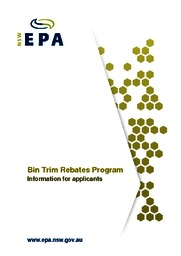- Aluminium (PDF 503KB): Australians already recycle 71% of aluminium cans, although 100% could be easily recycled. Clean and sorted aluminium is very valuable.
- Cardboard (PDF 469KB): Cardboard sent to landfill decomposes and generates methane, a potent greenhouse gas. Reduce the waste in your bins by separating and recycling cardboard.
- Coffee cups (PDF 264KB): Every year, around one billion disposable coffee cups end up in Australian landfill. About 300 million of these, or one third of the national total, are disposed of in NSW.
- Electronic waste (PDF 488KB): Electronic devices contain reusable components and valuable materials which can be recycled. Find out how to keep your computer from joining millions of others in landfill.
- Garden organics (PDF 498KB): Lawn clippings, bark, leaves, twigs and other prunings from landscaped areas can be separated for composting, creating a useful soil conditioner and avoiding harmful greenhouse gases.
- Glass (PDF 450KB): Glass can be recycled an infinite number of times. Your business can help recycle glass bottles, and save energy and raw materials.
- Paper (PDF 454KB): Paper and cardboard accounts for 23% of small business waste. There are simple ways for your business to reduce, reuse and recycle paper.
- Plastic film (PDF 471KB): Significant energy and valuable petrochemicals are locked in plastics. Find out the benefits of sending your old plastic wrap and used bags for recycling.
- Plastics identification code 1–7 (PDF 513KB): Clothing, carpet fibres, garden hoses and pallets are among the products that can be created from recycled plastic. Your business could be recycling all plastics marked with the Plastics Identification Code 1–7.
- Rigid plastics (PDF 454KB): Hard or rigid plastics can be recycled into a huge range of products. Find out how your business can send less plastic to landfill and avoid wasting significant energy and valuable petrochemicals.
- Steel (PDF 440KB): Steel can be recycled over and over again. You can save your business money by separating steel and recycling it.
- Wood and timber (PDF 494KB): Pallets sent to landfill from Sydney businesses each year would stack 533 kilometres high and reach further than the orbiting International Space Station. Find out how your business can recycle wood and timber.
What materials can my business recycle?
Recycling can reduce waste disposal costs, enhance businesses’ reputation and benefit the community and environment. These fact sheets provide advice on how small and medium-sized businesses can avoid, reduce, reuse and recycle different materials.
Page last updated


